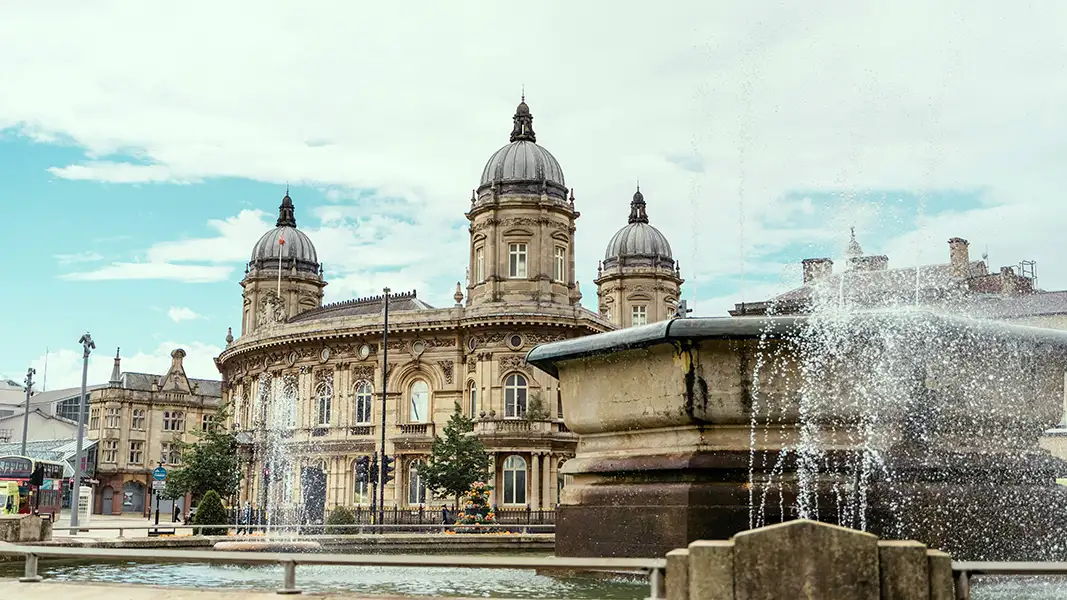Rotterdam - Hull
Ferries to England
Rotterdam - Hull
Ferries to England

Depending on the season their are usually 2 daily and 13 weekly sailings between Rotterdam and Hull. P&O Ferries provides the ferry from Rotterdam to Hull. Rotterdam Hull ferries cost between $504 and $1688, depending on ticket details. Prices exclude any service fees. Ferry timetables change seasonally, use our Deal Finder to get tickets, pricing, schedules and availability.
The earliest Rotterdam Hull ferry typically departs Rotterdam at about 20:30 and the last ferry usually leaves at 21:00.
Ferries from Rotterdam to Hull sail in around 11 hours 30 minutes. The fastest ferry is approximately 11 hours 30 minutes. Ferry duration can vary by ferry provider and can be impacted by weather conditions.
There is 13 weekly sailings from Rotterdam to Hull provided by P&O Ferries. Timetables can change from season to season.
The price of a ferry from Rotterdam to Hull typically range between $504* and $1688*. On average the Rotterdam Hull ferry is $1073*. The cheapest Rotterdam Hull ferry prices start from $504*. The average price for a foot passenger is $533*. The average price for a car is $1114*.
Pricing will vary depending on number of passengers, vehicle type, route and sailing times. Pricing is taken from searches over last 30 days and exclusive of service fees, last updated February 26.
The distance between Rotterdam to Hull is approximately 329 miles (529km) or 286 nautical miles.
Yes, Rotterdam Hull ferries allow cars onboard with P&O Ferries between Rotterdam and Hull. To view car ferry tickets and prices between Rotterdam and Hull use our Deal Finder.
P&O Ferries allow foot passengers on Rotterdam Hull ferries.
P&O Ferries allow pets on ferries from Rotterdam to Hull. Please also note that your pet may have to stay in the vehicle during the journey.
More routes than anyone else.

Compare fares, times & routes in one place.
Change plans easily with flexi tickets.

Book e-tickets & manage trips in-app.
Live ship tracking & real-time updates.

Top-rated customer support when you need it.
| Rotterdam - Hull Ferry Route Summary | ||
|---|---|---|
| Departure Country | Holland | |
| Destination Country | England | |
| No. of Operators | 1 | |
| Operators | P&O Ferries | |
| Average Price | $1073 | |
| Average Daily Sailings | 2 | |
| Average Weekly Sailings | 13 | |
| Average Sailing Duration | 11 h 30 m | |
| Fastest Sailing Duration | 11 h 30 m | |
| First Ferry | 20:30 | |
| Last Ferry | 21:00 | |
| Distance | 286 Nautical Miles | |
* Prices subject to change, pricing is taken from last 30 days, last updated 1 February 2026.
Rotterdam is the Netherlands second largest city and is one of the largest ports in the world. It is located in the province of South Holland in the west of the country, and to the south of Randstad. Since the city was founded in the 13th century it has grown into a major international centre for commerce. This has undoubtedly been assisted by the city's port which has a strategic location on the Rhine-Meuse-Scheldt delta on the North Sea and because of its road, air, rail and inland waterway connections. This had led the city often to be regarded as the "Gateway to Europe". The city has its own orchestra, the Rotterdam Philharmonic, a large congress and concert building named De Doelen, a couple of theatres and the Ahoy Rotterdam complex which is used for pop concerts, exhibitions and some sporting tournaments. In recognition of its cultural offerings Rotterdam was declared the European Capital of Culture in 2001.
The city's port is mainly a freight port although there is a passenger ferry service operating to the port of Hull in the UK with a crossing time of around 11 hours. Passenger facilities at the port include restaurants, cafes, bureau de change and disabled access.
The city of Hull, or Kingston-Upon-Hull to give it its full name, is a port that lies at the confluence of the River Hull and the Humber Estuary and has been a gateway to the heart of England since Roman times. The town was founded by King Edward I (1272 - 1307) who needed a secure port where his army could be supplied from, who were fighting the Scots at the time.
Hull's modern city is a large and busy city with many shops and facilities. There are a number of traffic free streets in the city which makes it a pleasant place to wander around and perhaps take in some of the open air entertainment that is on offer during the spring and summer. The glass covered Princes Quay is one of the country's most scenic shopping centres and rose from the water to sit above Prince's Dock. As one of the area’s largest shopping centres, it links the old and new parts of the town, leading to the heart of the city with sweeping views of the rejuvenated docklands.